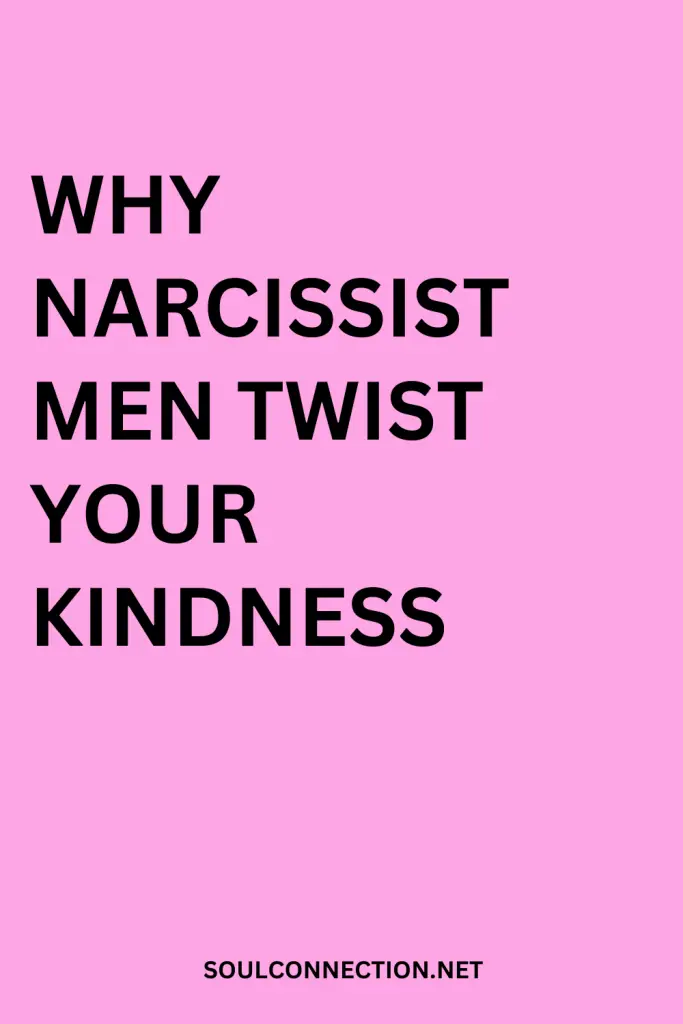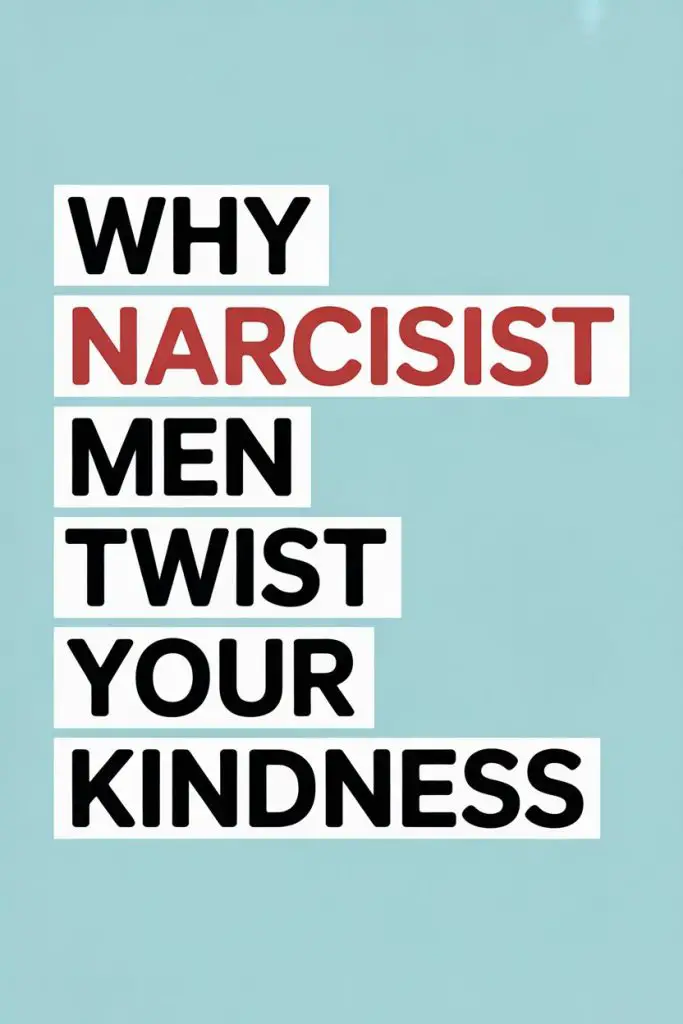Kindness is supposed to be a virtue, right? The world could do with more of it. But if you’ve ever crossed paths with a narcissist, you might have noticed that your gentle, giving nature seems to spark all sorts of mischief.
Suddenly, your patience becomes a tool for their agenda, your understanding becomes permission, and you’re left wondering: how did being nice turn into a magic trick for someone else’s ego?
Let’s roll up our sleeves and unravel how narcissist men twist your kindness, why they do it, and—most importantly—what you can do to keep your sweet soul safe (without having to turn into a cold-hearted lizard).
Spotting the Narcissist’s Favorite Playground
If narcissists had a park, your kindness would be the swing set, the slides, and the free snacks all rolled into one. For these men, generosity isn’t a quality to admire; it’s an opportunity. The more compassion you show, the more they see someone who might overlook their worst behavior.
Notice how early compliments and grand displays of gratitude come from narcissist men? Those remarks aren’t so much appreciation as reconnaissance.
“How much can I get away with if I butter her up first?” is the unspoken question. Your empathy becomes their data set.
Why Kindness Looks Like Weakness to a Narcissist
Healthy people see kindness as strength. Narcissist men, on the other hand, see it as a soft underbelly. They don’t value emotional connection. Instead, they hunt for loopholes.
When you forgive mistakes, they read it as “I can repeat this.” When you offer second chances, they hear “unlimited tries.” Every time you accommodate, they log it as “boundaries are optional here.”
This isn’t because you’re being naïve. Narcissists are skilled at testing limits. They poke and prod, waiting to see when you’ll cry foul.
If that moment never comes, they notch you on their list of easy targets.
Gaslighting: Twisting Kindness into Confusion
Kind people want to believe the best in others. Narcissists lean hard on this, using your goodwill to rewrite reality.
Maybe you let something slide because you don’t want to cause drama. Next thing you know, he’s telling you that you’re the one creating problems, or that you “always overreact.”
If you’re compassionate, you might doubt your own feelings or even apologize for having boundaries.
Welcome to gaslighting—the narcissist’s favorite party trick. They’ll leave you wondering if you’re the unreasonable one, while they quietly rewrite history to fit their narrative.
Flattery and Love-Bombing: The Bait Before the Twist
Think back to how things began. Was he extra attentive, quick to call you “the most amazing woman,” or full of stories about his traumatic past? Narcissist men love to create intensity early on.
This isn’t pure romance. They’re probing to see how much you’ll forgive down the road.
The more you swoon, the more convincing you’ll be when they need someone to defend their next questionable move.
Love-bombing is about laying the groundwork. Once you’re invested, those kind gestures become obligations.
Suddenly you’re expected to always understand, always forgive, always put him first—because he “loves you so much.”
Your Empathy Is Their Excuse
Ever found yourself making excuses for his outbursts, cold shoulders, or disappearing acts? “He had a tough childhood.” “He’s under a lot of stress.” “He’s just not used to real love.”
Narcissist men thrive when you’re willing to do emotional labor for them. Your desire to help, heal, or soothe isn’t met with gratitude. Instead, it’s ammunition for the next round of bad behavior.
If anything, he starts expecting you to manage his moods—while making you feel guilty if you ever need support yourself.
Moving the Goalposts: Kindness as a Moving Target
Ever noticed how your acts of kindness never seem to be enough? No matter what you do, there’s always another request, another emotional crisis, another way you’ve fallen short.
Narcissists are experts at moving the goalposts. They’ll thank you for your patience on Monday, but by Wednesday, it’s “why can’t you be more supportive?”
The rules change as soon as you start to catch on. This constant shifting keeps you off balance, always hustling for approval that never quite arrives.
It’s not about what you do; it’s about keeping you busy proving yourself. Kindness becomes a hamster wheel.
Turning Kindness Against You: The Martyr Complex
Here’s a sneaky move: twisting your kindness into martyrdom. Suddenly, you’re “too sensitive,” “too forgiving,” or even “too good for your own good.”
If you ever point out a problem, he’ll act like you’re attacking him—or worse, accuse you of being manipulative.
Before you know it, you’re apologizing for expecting basic respect. The script flips so completely you’re not sure which way is up.
You start asking yourself: am I being selfish for wanting something back? Spoiler: you’re not.
The Cycle of Reward and Punishment
Narcissist men have timing that would make a Swiss watch jealous. Whenever you assert yourself or pull back, they’ll dangle just enough kindness or affection to pull you back in.
Once you relax, the pattern repeats.
Kindness is no longer spontaneous; it’s currency. Give a little, get a little—until you’re back in the red. It’s a cycle designed to keep you hooked, never secure enough to ask for more, but never empty enough to walk away.
Boundaries: The Kryptonite Narcissists Hate
The single thing a narcissist cannot stand? A boundary that holds firm.
Kindness doesn’t mean giving in to everything. In fact, the more caring you are, the more you need strong boundaries. Imagine them like electric fences around your heart—only the respectful get through.
Try saying, “I love helping, but I can’t do this for you.” Watch the reaction. A healthy partner will respect your limit. A narcissist will panic, push, or pout.
Consistency is key. If the fence jolts them every time, they’ll eventually get the message—or they’ll wander off in search of someone easier.
How to Keep Your Kindness Without Losing Your Sanity
You don’t have to become cynical to protect yourself from narcissist men. Here’s what works in the wild:
- Get clear about what kindness means to you. It’s not self-sacrifice; it’s mutual respect.
- Trust your gut. If you’re always confused or apologizing, something’s off.
- Keep close friends in the loop. Outsiders spot patterns you might miss.
- Practice saying no—even if your voice shakes. Think of it as kindness to yourself.
- If someone consistently makes you feel drained, that isn’t love. That’s emotional vampirism.
You don’t have to change who you are. Just get tougher about who gets access to your golden heart.
When Kindness Meets Manipulation: Spotting the Signs
Still not sure if you’re being taken for a ride? Watch out for a few classic moves:
- Your compliments are never enough, but criticism is never forgotten.
- He expects patience for his baggage, but yours is “too much to handle.”
- Promises are big, follow-through is tiny.
- You’re always the one reaching out after an argument.
- He calls you “too emotional” whenever you express needs.
If these sound familiar, your kindness is being twisted. Set the record straight—starting tonight.
Taking Back Your Kindness
Loving, gentle people make the world bearable. Don’t let one narcissist man sour you on humanity. The right partner cherishes your kindness without using it as a loophole or leash.
Start small. Say no to something unreasonable. Ask for what you need. Watch how he reacts.
The people worth keeping will step up; the ones who don’t, well, you just dodged a bullet.
Your kindness isn’t a flaw. In the right hands, it’s the glue that holds real love together.
And if you need to—remind yourself: you’re not “too much.” You’re just too good to be twisted.


